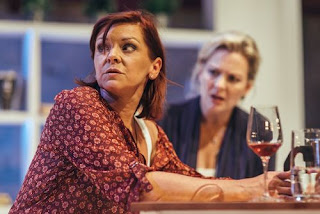Like many of the Pulitzer winners I've seen before, Dinner With Friends -
Donald Margulies' play won the literary prize in 2000 - concerns itself with middle
class American couples spending time in each others' homes. Unlike the others, it
isn't actually about racism, or indeed any subject larger than the relationships we
see on stage. Food writer Gabe (Shaun Dooley) and his wife Karen (Sara Stewart) are
having a friend and her children round for dinner, giving her a blow-by-blow account
of their recent holiday in Italy. It's not the relentlessness of their narrative
that makes Beth (Finty Williams) suddenly burst into tears though: She said the
reason her husband didn't join them at the dinner party was that he was away on
business, but in fact he's left her for another woman, and they're now planning to
get a divorce.
When Tom (Hari Dhillon) unexpectedly turns up in Beth's bedroom later that night,
he's furious: His wife got to their friends first, so they heard her side of the
story and may no longer want to hang out with him.
While the subject of couples breaking up is a common one in drama, Dinner With
Friends has found an angle that, while real - Jim said in the interval that he
could relate to the story - isn't often made the central issue: Where the friends of
a couple stand when they get divorced, especially when they consider themselves
close to both partners (here, Gabe and Karen were actually the ones who originally
introduced Beth and Tom.)
The first act is largely concerned with how the divorcing couple themselves try to
jockey for position with their friends. The second, which actually opens with a
flashback to them setting their friends up with each other*, sees Gabe in particular
question if the revelations about people who've been such a major part of his life
for so long, has some bearing on his own marriage. As it turns out he concludes it
doesn't, but Tom seems to almost wish that it did. (One positive about the show is
that it gives plenty to talk about: Tom doesn't want Gabe to offer any comments on
the great new life he says he now has; Jim and I concluded what he really wanted was
for his friend to be jealous of him, and was a bit put out when he wasn't.)
In many ways Tom's lack of likeability feels like a flaw with the play; although
we're often told Beth isn't as blameless as she makes out, the actual details are
withheld from us until too late for it to really affect the story. And although
there's some nicely observed funny moments early on, these do fade after a couple of
scenes and the play ends up feeling like it takes itself a bit too seriously given
its concerns are very narrow. Margulies' play has dated somewhat in that respect,
but Tom Attenborough's production has a sterling cast that makes the best of the
material, as well as an impressive set from David Woodhead that helps the small cast
make the many scene changes comparatively briskly. The knowledge that this won a
Pulitzer perhaps raises expectations that mean Dinner With Friends feels
surprisingly slight, but it's still an interesting evening if not a groundbreaking
one.
Dinner With Friends by Donald Margulies is booking until the 28th of November at
Park Theatre 200.
Running time: 2 hours 20 minutes including interval.
*maybe these kinds of scenes should have a compulsory "12 years earlier" caption
projected, because a couple of minutes in when it became apparent this was a
flashback, the entire audience seemed compelled to explain this to each other. "OH!
THIS IS IN THE PAST!"




No comments:
Post a Comment